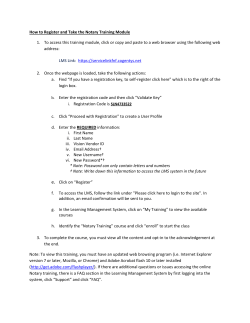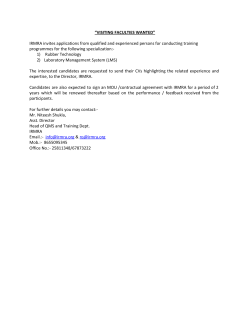
Next View LMS - Workforce Planning & Scheduling
Eliminate your spreadsheets and use a LMS to optimize your warehouse staffing Sponsored by: Presented by: Bob Rosales © 2015 MHI® Copyright claimed for audiovisual works and © 2015 Next View Software, Inc.sound recordings of seminar sessions. All rights reserved. Next View Cloud Engineered Labor Standards PF&D Frequencies MOST MTM MSD XYZ & Travel Calculations Productivity & Utilization Reporting Real-time Dashboards & Charts Direct & Indirect Labor Tracking Workforce Planning & Scheduling Coaching & Mentoring Observation Management Single & Multi-variable Standards On-Demand/SaaS Platform © 2015 Next View Software, Inc. “Labor Management Systems need to plan tomorrow and manage today and not just report on yesterday.” © 2015 Next View Software, Inc. Labor Management System What does a LMS do? Yesterday Tomorrow Today © 2015 Next View Software, Inc. Labor Management System Yesterday Captures Performance Data Efficiency (% of standard) Utilization (direct vs indirect) Calculate data for incentive based pay Essential tool for worker review Maintain historical data (Costing, KVI) © 2015 Next View Software, Inc. Labor Management System Fair Standard Single Variable Standard – units or lines/hour Engineered Standard – discrete steps including travel Cart A 20 lines 28.30 minutes Cart B 35 lines 24.32 minutes © 2015 Next View Software, Inc. Labor Management System Heel to toe timeline for each worker WMS Timeclock Pick Pick Putaway Clock-In Clock-Out RF Trailer Unload Kiosk LMS 8am Heel to Toe Timeline Checkin Pick Trailer Unload Break Housekeeping Break Trailer Unload Break Housekeeping Break 5pm Clock-In Pick Pick Checkin Trailer Unload Pick © 2015 Next View Software, Inc. Clock-Out Putaway Labor Management System Business Intelligence: query, chart, and report © 2015 Next View Software, Inc. Labor Management System Requirements to Capture Yesterday’s Data Real-time interface not important Data can be download every 5 minutes or once a day Engineered standards create more accurate data but not a requirement Requires maintenance to keep engineered standards accurate But what about tomorrow and today? © 2015 Next View Software, Inc. Labor Management System Tomorrow Plan future labor requirements Maintain historical labor rates Input forecast and actual demand Estimate planned labor activities Plan FTE by work center Estimate temps and overtime © 2015 Next View Software, Inc. Labor Management System Requires Multi-Level Planning Model Data Historical orders ERP Level Data Orders scheduled Actual Demand Orders Customer orders Continuous Planning Process © 2015 Next View Software, Inc. Labor Management System Fill In Missing Activities Create additional activities Replenishment, Putaway, Loading Estimate sub-activity type RF vs Fluid Receiving, Pick by Light vs Paper LMS can provide historical data © 2015 Next View Software, Inc. Labor Management System Determine Planning Rates What is the rate for receiving, putaway, picking loading? LMS can determine based on historical data Performance Utilization © 2015 Next View Software, Inc. Labor Management System Requirements to Plan Tomorrow’s Data Real-time interface not important Can use non-engineered standards Based on aggregate FTE per department Don’t need employee roster But what about today? © 2015 Next View Software, Inc. Labor Management System Today Manage today’s labor requirements Monitor real-time work center performance Assign workers based on demand Estimate goal time Show percentage of completion Manage budget for temps and overtime © 2015 Next View Software, Inc. Labor Management System Goal Time Based on actual demand data inbound PO pick list Utilize engineered standard multi-variable (volume, weight) travel Very accurate estimate of future activities © 2015 Next View Software, Inc. Labor Management System Assign Workers to Activities Workers assigned to actual labor activities based on goal time estimate Activities can be discrete or aggregated by time Show percentage of completion Need for workers in different work centers © 2015 Next View Software, Inc. Labor Management System Challenge: Different Assignment Models Discrete labor activities Assign to inbound/outbound load, pick list Case/pallet warehouse Time based activities Aggregate by time and work center Assign worker to center for fixed time period (10-11am) E-commerce warehouse Hybrid facility Some areas are discrete and some are time based Retail warehouse © 2015 Next View Software, Inc. Labor Management System Requirements to Track Today’s Data Real-time interface is essential for both actual demand and performance data Need engineered standards to accurately calculate goal time Most Important! Need to integrate into workforce scheduling to manage workers © 2015 Next View Software, Inc. What is the state of the art technology used to schedule workers in warehouses? We asked our customers © 2015 Next View Software, Inc. Labor Management System Spreadsheets © 2015 Next View Software, Inc. Amazing use of spreadsheet technology © 2015 Next View Software, Inc. Labor Management System Spreadsheet Scheduling Model work center labor rates and capacity Input future workload Breakdown future workload by work center Estimate FTE per work center Assign workers to schedule based on need Record actual labor and calculate daily costs © 2015 Next View Software, Inc. Labor Management System Spreadsheet Limitations Not integrated to HR or ERP or WMS Manually maintain work roster including days off, etc Calculate historical labor rates Determine labor activity breakdown models Input actual demand Record time clock data © 2015 Next View Software, Inc. Huge clerical effort but also significant overlap with LMS functionality © 2015 Next View Software, Inc. Labor Management System Additional Features in LMS for Workforce Scheduling Maintain worker roster with skills, department info Create weekly, daily shift schedule Store HR data such as wage, vacation, days offs Maintain both full and temp roster Interface to HR systems All labor planning features already built-in to LMS © 2015 Next View Software, Inc. Labor Management System Integrated LMS/Workforce Scheduling Tomorrow’s data Model based on historical performance data Input forecast and actual demand Estimate FTE by work center Assign workers to weekly/daily shift schedule Continuous model as demand changes Re-assign workers based on demand © 2015 Next View Software, Inc. Labor Management System Integrated LMS/Workforce Scheduling Today’s data Manage real time worker levels per work center Calculate goal time based on actual demand data Aggregate demand by work center based on scheduled time Assign workers to either discrete activities or work centers Monitor percentage of completion Move workers based on need © 2015 Next View Software, Inc. Labor Management System Integrated LMS/Workforce Scheduling Yesterday’s data Record actual time clock data for each worker Calculate worker performance data Generate labor costs by work center Compare to budgeted costs Maintain historical data for future planning © 2015 Next View Software, Inc. Labor Management System Benefits of Integrated LMS and Workforce Scheduling Workforce scheduling is currently done with spreadsheets Very time consuming for warehouse staff Accurate labor scheduling for tomorrow and today Reduce overtime and temp costs Manage labor costs in real-time © 2015 Next View Software, Inc. Labor Management System Possible LMS Implementation Approaches Planning First or Performance First © 2015 Next View Software, Inc. Labor Management System For More Information: Speaker email: bob.rosales@nextviewsoftware.com Website: www.nextviewsoftware.com or visit ProMat 2015 Booth 4473 © 2015 Next View Software, Inc.
© Copyright 2025












